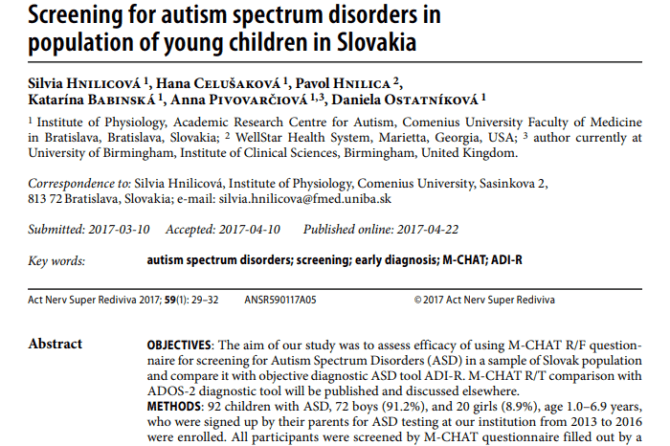
AUTORI: Hnilicová, S., Celušáková, H., Hnilica, P., Babinská, K., Pivovarčiová, A., Ostatníková, D.
ABSTRACT: OBJECTIVES: The aim of our study was to assess efficacy of using M-CHAT R/F questionnaire for screening for Autism Spectrum Disorders (ASD) in a sample of Slovak population and compare it with objective diagnostic ASD tool ADI-R. M-CHAT R/T comparison with ADOS-2 diagnostic tool will be published and discussed elsewhere.
METHODS: 92 children with ASD, 72 boys (91.2%), and 20 girls (8.9%), age 1.0–6.9 years, who were signed up by their parents for ASD testing at our institution from 2013 to 2016 were enrolled. All participants were screened by M-CHAT questionnaire filled out by a parent and then complex psychological assessment by trained staff was performed. Latter evaluation included ASD diagnostic tools: Autism Diagnostic Observation Schedule – second revision (ADOS-2) and Autism Diagnostic Interview-Revised (ADI-R).
RESULTS: Significant difference of total (sum) score of M-CHAT means between group of children with ASD and without ASD (as diagnosed by using ADOS and ADI-R) was observed (p<0.001). M-CHAT total score significantly correlated with ADI-R A Domain Abnormalities in Reciprocal Social Interaction, (r=0.583; p<0.01); ADI-R B Domain – Qualitative Abnormalities in Communication (r=0.357; p<0.01).
CONCLUSION: We demonstrated that in our sample of Slovak children M-CHAT total score can be used to differentiate between children with and without ASD risk. M-CHAT also well correlated with accepted objective measure for diagnosis of ASD, i.e. ADI-R. Future work is needed to determine the sensitivity and specificity of M-CHAT in screening for ASD in general population of children in Slovakia.
Activitas Nervosa Superior Rediviva. – Vol. 59, No. 1 (2017), s. 29-32. – ISSN (print) 1337-933X


